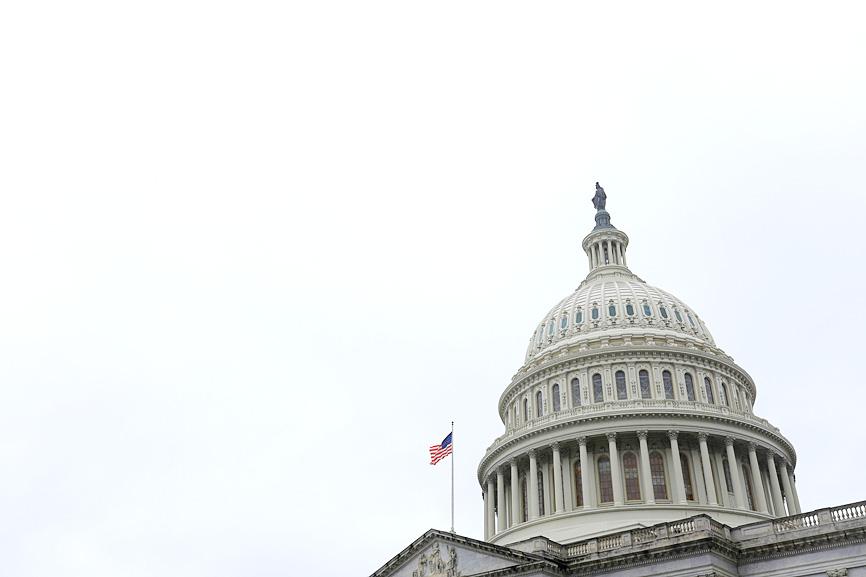The US Senate on Monday passed an omnibus competitiveness bill that includes provisions to enhance military, cultural and diplomatic ties with Taiwan, but obstacles remain in having the bill enacted into law.
The Senate approved the America COMPETES Act by a 68-28 margin after the House of Representatives passed an act of the same name by a 222-210 vote on Feb. 4.
However, the bill approved by the Senate replaced the original content of the America COMPETES Act with that of the US Innovation and Competition Act (USICA), which the senate passed on June 8 last year.

Photo: Reuters
Both bills are aimed at increasing the competitiveness of the US — in particular against China — with a significant emphasis on boosting scientific and engineering innovation, research and development, and production of advanced electronic components in the US.
There was considerable overlap between the USICA and the original contents of the America COMPETES Act, including on regional strategies to counter China.
However, substantive differences also exist in several areas, including economic diplomacy, strategic and diplomatic matters, and multilateral strategies to bolster US power.
The House is not expected to agree to the latest version approved by the Senate, meaning that the two bodies will have to negotiate a reconciliation of the bills they passed into a final version that can get 60 votes in the Senate and pass a divided House.
With respect to Taiwan, both bills generally reiterate US support for Taiwan, recognizing Taiwan as a “vital part” of the US’ Indo-Pacific strategy and a vital national security interest of the US.
They require the US to reinforce its commitments to Taiwan under the Taiwan Relations Act and the “six assurances,” and conduct regular transfers of “defense articles” to enhance Taiwan’s self-defense capabilities, in particular its efforts to develop and integrate asymmetric capabilities.
They both call on the US secretary of state to consider establishing a US-Taiwan cultural exchange foundation “dedicated to deepening ties between the future leaders of Taiwan and the United States,” and contain lengthy provisions on a Taiwan fellowship program to allow government officials to go to Taiwan for two years to learn Chinese.
However, there are key differences.
The House-backed bill calls for negotiations on renaming Taiwan’s representative office in the US — the Taipei Economic and Cultural Representative Office — while the Senate version does not.
It also includes a Taiwan Peace and Stability Act, which focuses specifically on enhancing deterrence measures in the Taiwan Strait, and a Taiwan International Solidarity Act that are not found in the Senate bill.
The Senate bill does call for ending the practice of referring to Taiwan’s government as the “Taiwan authorities” and for ending restrictions on officials of the two sides to interact directly with each other or on Taiwan to display symbols of the Republic of China’s sovereignty.
However, it says these appeals should not be “construed as entailing restoration of diplomatic relations with the Republic of China (Taiwan) or altering the United States Government’s position on Taiwan’s international status.”
No similar disclaimer is found in the House bill.
In another key area of the bills, involving incentives for the production of semiconductors in the US, the two bills offer similar language, but the House bill has been described as more aggressive in creating a new Supply Chain Resilience Program.
Overseas suppliers, such as Taiwan semiconductor giant Taiwan Semiconductor Manufacturing Co, have lobbied for foreign manufacturers to benefit from the measure, but it was not immediately clear if the two bills differed on this point.

Taiwan is stepping up plans to create self-sufficient supply chains for combat drones and increase foreign orders from the US to counter China’s numerical superiority, a defense official said on Saturday. Commenting on condition of anonymity, the official said the nation’s armed forces are in agreement with US Admiral Samuel Paparo’s assessment that Taiwan’s military must be prepared to turn the nation’s waters into a “hellscape” for the Chinese People’s Liberation Army (PLA). Paparo, the commander of the US Indo-Pacific Command, reiterated the concept during a Congressional hearing in Washington on Wednesday. He first coined the term in a security conference last

Prosecutors today declined to say who was questioned regarding alleged forgery on petitions to recall Democratic Progressive Party (DPP) legislators, after Chinese-language media earlier reported that members of the Chinese Nationalist Party (KMT) Youth League were brought in for questioning. The Ministry of Justice Investigation Bureau confirmed that two people had been questioned, but did not disclose any further information about the ongoing investigation. KMT Youth League members Lee Hsiao-liang (李孝亮) and Liu Szu-yin (劉思吟) — who are leading the effort to recall DPP caucus chief executive Rosalia Wu (吳思瑤) and Legislator Wu Pei-yi (吳沛憶) — both posted on Facebook saying: “I

Sung Chien-liang (宋建樑), who led efforts to recall Democratic Progressive Party (DPP) Legislator Lee Kun-cheng (李坤城), was released on bail of NT$80,000 today amid outcry over his decision to wear a Nazi armband to questioning the night before. Sung arrived at the New Taipei District Prosecutors’ Office for questioning in a recall petition forgery case last night wearing a red armband bearing a swastika, carrying a copy of Adolf Hitler’s Mein Kampf and giving a Nazi salute. Sung left the building at 1:15am without the armband and covering the book with his coat. Lee said today that this is a serious

The Ministry of Economic Affairs has fined Taobao NT$1.2 million (US$36,912) for advertisements that exceed its approved business scope, requiring the Chinese e-commerce platform to make corrections in the first half of this year or its license may be revoked. Lawmakers have called for stricter enforcement of Chinese e-commerce platforms and measures to prevent China from laundering its goods through Taiwan in response to US President Donald Trump’s heavy tariffs on China. The Legislative Yuan’s Finance Committee met today to discuss policies to prevent China from dumping goods in Taiwan, inviting government agencies to report. Democratic Progressive Party Legislator Kuo Kuo-wen (郭國文) said